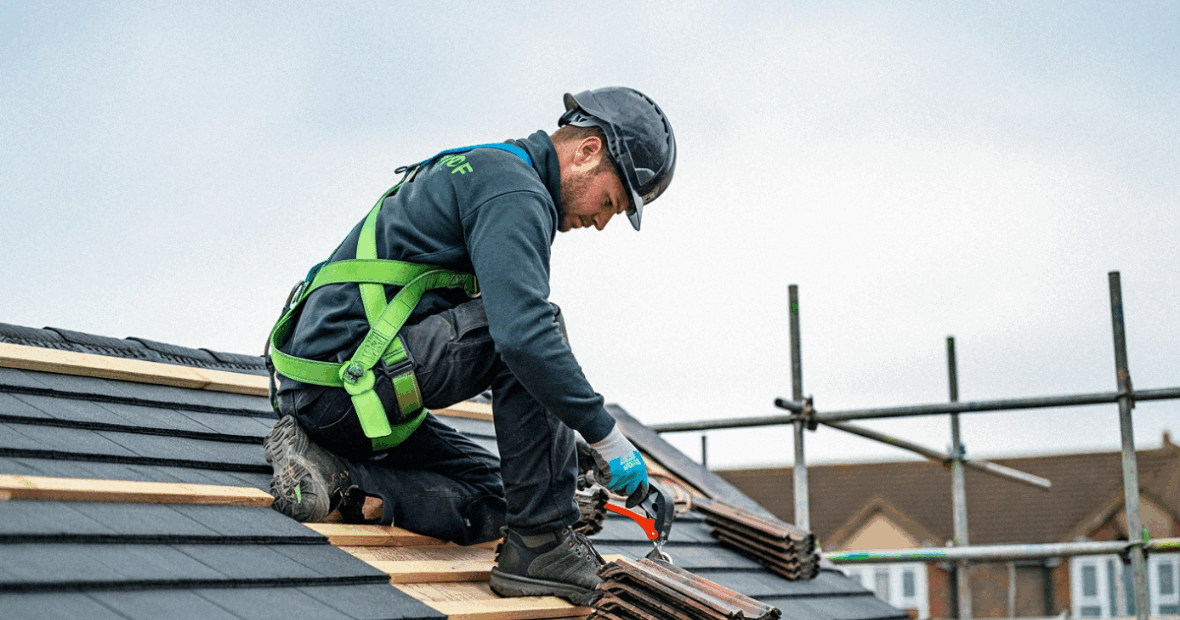Roofers in the UK are an essential part of the construction industry, ensuring the safety, durability and aesthetic appeal of both residential and commercial buildings. Roofing professionals who deliver top-quality work apply tiles, slates and metal sheets to repair or construct roofs. Understanding roofer compensation at various stages of experience combined with geographical location and factors affecting pay provides valuable details about this fulfilling trade. This comprehensive guide presents information about roofer salaries while exploring earning influences and education requirements to become a roofer throughout the United Kingdom. A thorough review outlines apprentice compensation, salary scale details and job responsibilities.
Roofer Salaries by Experience Level
Roofer salary varies significantly based on experience and employment type:
- Beginners typically earn around £17,000 annually.
- Mid-career roofers earn between £24,000 and £30,000 annually in most regions, based on skills and demand.
- Experienced Roofer Salary: Up to £35,000 per year.
- Self-employed roofers or business owners have the highest earning potential due to increased control over pricing and expenses—up to £70,000.
City-Specific Salaries
Roofer salaries also depend on location due to regional demand and cost of living:
| City/Region | Average Salary |
| Beckenham | £55,000 |
| Wimborne | £55,000 |
| North London | £52,650 |
| Norwich | £47,288 |
| Bristol | £41,500 |
| Sunderland | £42,900 |
Roofers in cities like Beckenham and Wimborne earn significantly higher salaries than those in smaller towns or less urbanised areas.
Key Factors Influencing Salaries
Several factors affect roofer earnings:
- Experience Level: Experienced roofers secure better income compensation.
- Employment Type: Self-employed roofers and business owners achieve better earnings than workers in company-based roofing positions.
- Location: The urban environment tends to pay higher wages than other locations.
- Specialisation: A person specialising in heritage roofs or complex construction work can make higher premiums due to their speciality.
What Roofers Do in the UK
Roofers are responsible for:
- Installing and repairing roofs using cement, tiles, clay, or metal.
- Working safely at heights using scaffolding and hand tools.
- Inspecting roofs for damage and identifying potential faults.
- Maintaining roofing systems, including traditional thatched roofs or modern flat roofs.
- Reading blueprints or following client specifications to implement designs.
- Specialised roofers may work on period buildings or heritage projects requiring advanced skills.
Becoming a Roofer in the United Kingdom
To become a roofer in the UK, you can follow these educational pathways:
- Apprenticeship: A roofing apprenticeship requires 2-3 years of combined practical experience on construction sites with theoretical education at classroom facilities. The typical result of this training path is obtaining the Level 2 NVQ Diploma in Roofing Occupations.
- College course: Undertake a vocational course such as the Level 2 Diploma in Roofing Occupations or Roof Slating and Tiling. These courses typically last 1-2 years.
- On-the-job training: Certain companies employ inexperienced personnel and instruct them through on-the-job training at their facilities.
- Certification: Obtain a Construction Skills Certification Scheme (CSCS) card and other relevant certifications, such as work at heights and asbestos awareness.
The UK does not require a university degree to practise roofing. However, after gaining essential experience in roofing occupations or roof slating and tiling work, one must obtain a Level 3 NVQ Diploma qualification to elevate specialised roof work.
Apprentice Wages:
In the United Kingdom, apprenticeships typically last 2–3 years, combining on-site training with formal qualifications. As of April 2024, the minimum wage for apprentices starts at the National Minimum Wage of £6.40 per hour during their first year, rising to age-appropriate minimum wage rates after completing this period.
- Aged 16 to 18: £6.40 per hour.
- Aged 19 or over and in the first year: £6.40 per hour.
- For those aged 18-20: Around £8.60 per hour.
- For ages 21 and over: About £11.44 per hour.
What Do Apprentice Roofers Do
Apprentice roofers complete multiple tasks that help their skill development and project roofing work. Their responsibilities typically include:
- Roof Installation and Repairs: The installation and repair of rooftops involve installing or fixing tile materials, shingles, slates and waterproof membrane elements on either level surfaces or sloping rooftops.
- Material Handling: The worker handles materials through measurement and markings and uses roofing materials for fitting and final attachment using securement methods. The process includes fetching materials from delivery, placing them into storage and maintaining correct storage practices.
- Technical Work: Workers must convert technical construction plans into precise office actions for roofing projects.
- Safety and Maintenance: Workplace safety is ensured by following health and safety principles, properly using personal protective equipment (PPE)and regularly maintaining all equipment and tools.
- Customer Interaction: During customer interaction, the roofer provides roofing material recommendations to clients, generates cost projections and delivers project updates.
- General Labour: Experienced roofers receive support with heavy material transport and job site preparation at the general labour level.
Training and Education for Roofing Apprenticeship
To become an apprentice roofer in the UK, the prerequisites generally include:
- Age Requirement: You must be at least 16 years old and no longer in full-time education.
- Educational Qualifications: Most employers and apprenticeship programs require GCSE passes in English and Maths at grades 2-3 (D-E) or higher. Alternatively, Level 1 Functional Skills in English and Maths can be completed during the apprenticeship.
- Physical Fitness: Good physical fitness is essential, as roofing involves working at heights and outdoors in various weather conditions.
- Skills and Attributes: Employers look for candidates with teamwork skills, attention to detail, time management, logical thinking and a head for heights.
Roofing offers diverse career opportunities in the UK, with salaries varying significantly based on experience, location and specialisation. By undergoing different educational levels in roofing, from apprentice to expert certifications, one can acquire vital skills while earning progressively higher compensation. Roofing is an essential construction and maintenance field nationwide because it brings self-employment possibilities and pays well.
